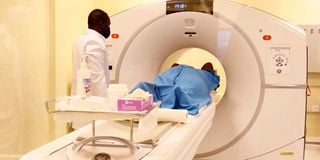KMPDC declines to clear foreign oncologists hired to replace striking medics

A patient undergoes cancer screening at the Integrated Molecular Imaging Center at the Kenyatta University Teaching Referral and Research Hospital on January 10, 2022.
What you need to know:
- Four oncologists from Ethiopia and one from Malawi were hired last week.
- Hundreds of Kenyans in dire need of chemotherapy have been sent home.
Hundreds of cancer patients at the Kenyatta University Teaching, Referral & Research Hospital (KUTRRH) in dire need of chemotherapy may be sent away unattended.
This is after the Kenya Medical Practitioners and Dentists Council (KMPDC) licensing committee refused to clear four Ethiopian oncologists who have already reported to the hospital.
Last week, KUTRRH board chair Prof Olive Mugenda told the Nation that they had hired four foreign oncologists from Ethiopia and one from Malawi after medics at the facility downed their tools and joined the ongoing nationwide doctors strike.
Prof Mugenda further disclosed that hundreds of Kenyans in dire need of chemotherapy had been sent home as there was no one to attend to them, which is why the board, with consent from the government, hired the foreign oncologists and then recalled the patients to return for treatment.
According to the KMPDC licensing committee, the four Ethiopian oncologists are not qualified by Kenyan standards.
"We asked them for their degree certificates as doctors and specialist certificates as medical oncologists. What they presented was not satisfactory. This is not about the ongoing strike. We are a very independent committee whose mandate is to ensure Kenyans get quality healthcare," a senior licensing committee member, who is not authorised to speak, told the Nation.
"This is why our committee has officially rejected them. They have completed fellowships in some areas of oncology, but do not have the necessary skills that even we as members would trust them to treat us."
The official further disclosed that only the Malawian oncologist is qualified.
"The Malawian is very qualified and knowledgeable," the source said.
In an interview with Nation, KMPDC CEO David Kariuki confirmed that the board had rejected the four Ethiopian oncologists.
"In terms of training, they are trained as doctors, but they do not meet requirements when it comes to the clinical experience to work independently; that's how we felt," he said.
Last week, medics at KUTRRH told the Nation that the hospital had given them warning letters for participating in the doctors' strike and threatened to fire them.
"No one knows where the hospital board picked the three Ethiopians from or even if they are trained or qualified to be doctors because there is a clear protocol on how foreign-trained doctors are registered to work in the country, and none of that was followed," said a KUTRRH medic who was participating in the strike.
The doctor also accused the hospital of insisting they leave the doctor's union and attempting to force the hospital CEO out.
"It is our right; we shall stand with our colleagues, and if the board wishes, let them bring 250 more Ethiopians."
When the Nation contacted Prof Mugenda on phone to seek her comment on the doctors' sentiments, she rubbished the allegations.
"This is what I want to tell all these KUTRRH medics saying these things, let us not politicise healthcare. The CEO, Mr Dagane, is away on leave, and there is an acting CEO in place. This was the board's decision," she said.
"Some patients who have begun chemotherapy and need it urgently are at home because medics are not showing up. Is that fair? These are people's lives, and we should not play politics with human beings' lives.
"That is why, after consulting with the board, we decided to hire some foreign doctors to help us, with permission from the government. So far, the facility has enlisted the services of four oncologists from Ethiopia, Malawi, and Tanzania, allowing some critical services to resume," she told the Nation.
"This is why we were able to conduct about 40 chemotherapy sessions on Monday this week. We have 250 medics, but only 82 were reporting to work. I have seen someone say we can hire 100 if we want; let them know we have only hired oncologists. We do not know if the striking doctors will be back.
"Those who stopped working have letters of dismissal, and some have suspension letters. The ones we hired will remain even if the others come back. If they do come back, those with suspension letters must face a disciplinary committee," Prof Mugenda further said.





